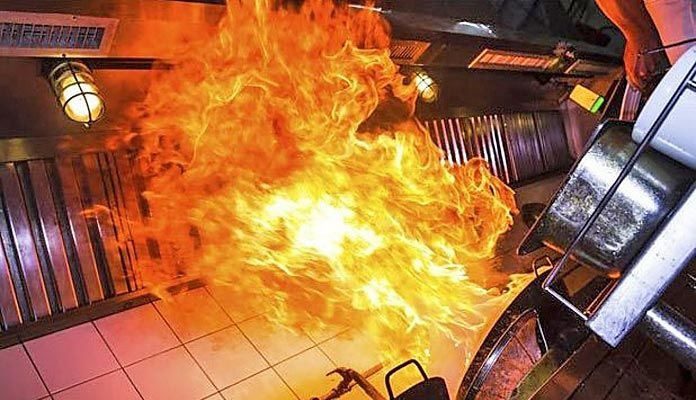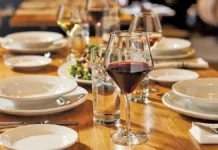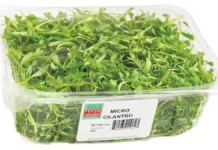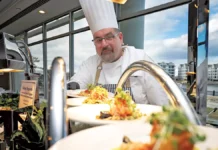
Fires are one of the leading causes of property insurance losses. In addition to physical damage to your restaurant and property, fires can also cause serious injuries or deaths, and disrupt business operations for months or even years to come. Typically caused by flare-ups during food preparation or from oven, burner or electrical and gas connection defects, kitchen fires can be prevented.

The leading cause of kitchen fires is unattended cooking. Restaurant owners and managers can chose to implement proactive fire loss prevention programs at their facilities, greatly reducing fire risks and potentially securing better property insurance terms, conditions, and pricing.
Food Preparation
Keep hot pads, oven mitts, wooden utensils, food packaging and towels away from any heat source. The kitchen should never be left unattended while cooking. If the staff must leave the kitchen for even a short period of time, all heat sources should be turned off. If using a microwave to reheat and sparks are noticed, the microwave must be shut off the microwave immediately, the incident should be reported to management. All burners, ovens and appliances should be checked to make sure they are off before closing down for the day.
Hood and Ventilation System Maintenance
Proper installation and regular maintenance of the kitchen hood and ventilation system is a vital component of kitchen fire safety. The hood and ventilation system should be professionally installed according to National Fire Protection Association (NFPA) Standard 96, which is the official standard for “Ventilation Control and Fire Protection of Commercial Cooking Operations”.
Hoods, grease-removal devices, fans, ducts and other equipment should be serviced by a qualified contractor at intervals necessary to prevent the accumulation of grease. Filters should be cleaned regularly to prevent the build-up of grease. Frequency of cleaning will depend upon the amount of grease observed during an inspection.
A written cleaning schedule should be established as a best practice. Following the inspection or cleaning, a label indicating the date cleaned and the name of the servicing company should be prominently displayed in a visible location.
Electrical Preventative Maintenance
Electrical failures are another common cause of fires. In order to prevent electrical fires, preventative maintenance programs are crucial. Restaurants should contract with a licensed electrician to perform routine inspections and maintenance on all electrical equipment. Infrared Thermography (IR) is an effective tool that can aid electricians with detecting load imbalances or other circuit deficiencies that would otherwise be invisible to the naked eye. Consult your electrician about the need for IR to be conducted at your facility. Also inspect your facilities for visible electrical deficiencies on a routine basis. These might include; open or damaged electrical panels, use of extension cords as permanent wiring, electrical tape repairs to wiring, missing ground prongs, and others.
Fire Protection Equipment Inspection, Testing and Maintenance
Having a properly maintained and monitored automatic sprinkler system is one of the most effective protective measures available. There are also special protection systems that should be considered for properties with commercial cooking operations.
Fire protection systems should be installed and serviced by licensed, insured, and qualified contractors in accordance with all applicable NFPA standards. Fire protection should be monitored by central station alarms, that are attended 24/7. Be aware that some jurisdictions have not yet adopted the newer NFPA code versions, and their requirements may not be as robust as the current codes. As this subject can become very complex, we recommend that you consult with your broker regarding your specific fire protection needs.
Emergency Response Planning
Comprehensive emergency response plans are critical to ensure that your staff and patrons can safely exit the building in the event of a fire, or other emergency. A thorough emergency response plan should provide communication guidance procedures for fire, police and local utilities. The plan should be drilled periodically, even if not required by the local jurisdiction. Many organizations find errors or problems with their plans during an actual emergency, which is too late. The plan should also contain an emergency vendor list with contacts such as; insurance broker claims representative, disaster restoration/remediation contractor, fire protection contractor, electrician, plumber, etc. Following a fire or other major loss, time is of the essence and prompt action can mitigate further damage and potentially minimize downtime.
While these loss prevention strategies are common to many types of properties, this is not an all-inclusive list. Each restaurant is unique, which should have a loss prevention program that is tailored to the existing conditions. Your insurance broker can help develop a customized property loss prevention program that suits your needs.























